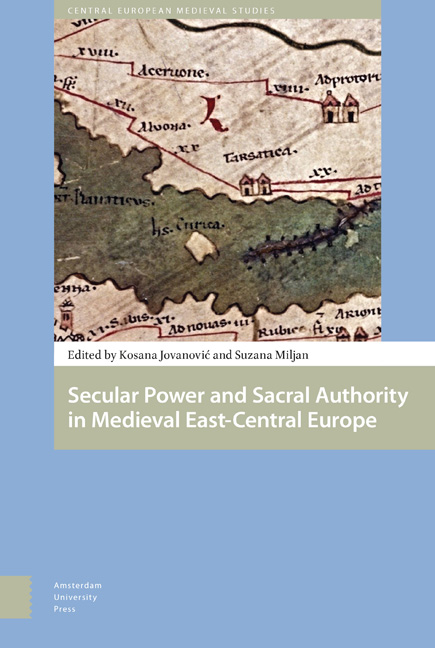Book contents
- Frontmatter
- Contents
- List of Figures and Tables
- Acknowledgements
- Foreword
- Folklore of the Medieval Kings of Hungary: Preliminary Research Report
- Variations on Nobility in Central and South-Eastern Europe: An Introduction
- The Changes of Office of Ban of Slavonia after the Mongol Invasion in Hungary (1242-1267)
- The Reconstruction and Role of Roads in the Formation of a Medieval Cultural Landscape: The Example of Episcopal Estates of Dubrava, Ivanić and Čazma
- From Castle-Warrior to Nobleman: Case Study of a Family of Slavonian Lesser Nobility
- Late Medieval Village in Turopolje (Slavonia): The Example of Donja Lomnica
- Economic Development and Transformation of the Pauline Monasteries near Senj under the Frankapan Patronage
- The Society of the Noble Judges in Northeastern Hungary during the Reign of King Sigismund (1387-1437)
- Development of Ragusan Diplomatic Service in the First Half of the Fifteenth Century: Father and Son at the Court of Duke Sandalj Hranić
- Croatian Students at the University of Prague in the Fifteenth Century
- A Contribution to Medieval Croatian Diplomatics: Cyrillic Charters of Croatian Nobility from the Franciscan Monastery on Trsat in Rijeka
- Peter of Crkvica, a Man Who Could Be Trusted: The Career of a Middle-Ranking Cleric and Diplomat in the Kingdom of Hungary in Mid-Fifteenth Century
- The Nobility of the Despotate of Serbia between Ottoman Empire and Hungary (1457-1459)
- List of Contributors
- Index
Development of Ragusan Diplomatic Service in the First Half of the Fifteenth Century: Father and Son at the Court of Duke Sandalj Hranić
Published online by Cambridge University Press: 12 December 2020
- Frontmatter
- Contents
- List of Figures and Tables
- Acknowledgements
- Foreword
- Folklore of the Medieval Kings of Hungary: Preliminary Research Report
- Variations on Nobility in Central and South-Eastern Europe: An Introduction
- The Changes of Office of Ban of Slavonia after the Mongol Invasion in Hungary (1242-1267)
- The Reconstruction and Role of Roads in the Formation of a Medieval Cultural Landscape: The Example of Episcopal Estates of Dubrava, Ivanić and Čazma
- From Castle-Warrior to Nobleman: Case Study of a Family of Slavonian Lesser Nobility
- Late Medieval Village in Turopolje (Slavonia): The Example of Donja Lomnica
- Economic Development and Transformation of the Pauline Monasteries near Senj under the Frankapan Patronage
- The Society of the Noble Judges in Northeastern Hungary during the Reign of King Sigismund (1387-1437)
- Development of Ragusan Diplomatic Service in the First Half of the Fifteenth Century: Father and Son at the Court of Duke Sandalj Hranić
- Croatian Students at the University of Prague in the Fifteenth Century
- A Contribution to Medieval Croatian Diplomatics: Cyrillic Charters of Croatian Nobility from the Franciscan Monastery on Trsat in Rijeka
- Peter of Crkvica, a Man Who Could Be Trusted: The Career of a Middle-Ranking Cleric and Diplomat in the Kingdom of Hungary in Mid-Fifteenth Century
- The Nobility of the Despotate of Serbia between Ottoman Empire and Hungary (1457-1459)
- List of Contributors
- Index
Summary
One of the significant characteristics of the Ragusan foreign affairs during the medieval period was avoiding armed conflicts. When the authorities did not manage to implement this endeavour, diplomacy played an important role in attempts to end them and insure damage reparations. In the first half of the fifteenth century the city of Dubrovnik was involved in Ragusan- Bosnian war (1403-1404) and the War of Konavle (1430-1433). During both conflicts the government turned for help to Duke Sandalj Hranić of Bosnia. During the first war, duke was in the process of rising to his fame, and the ending of this particular war, that brought Ostoja's dethronisation and the fall of the Sanković family, marked Hranić's rise to power. During the second war he was the key partner in Dubrovnik`s plan of destroying the hostile family Pavlović of Bosnia.
The importance of Duke Sandalj for the outcome of these conflicts sets the assumption that the government carefully took into account to select the most skilled noble for a holder of the mission. Marin, son of Nifiko de Gondula (around 1355-1405) and his son Benedict (around 1390-1446) received this confidence. It is interesting to notice that almost none of them had had an earlier experience in the service. On the other hand, they took advantage of the ‘symbolic capital’ of their predecessors that enjoyed high political and social reputations in fulfilling diplomatic missions. Marin’s father, Nifiko de Gondula (around 1315-1355), was Ragusan ambassador to the Emperor Stephen Uroš IV Dušan of Serbia in 1346, and two years later, he was engaged as an ambassador in Venice. His brother Nicholas (around 1345-around 1411) was the rector of Dubrovnik more than ten times and a holder of diplomatic missions to the king of Hungary-Croatia, ban of Dalmatia and dukes of Serbia.
From the nominee's perspective, it was harder to find a candidate willing to apply for the tasks that were very hard to achieve. Although the election of Marin de Gondula went smoothly, the ambassador to Sandalj's court in April 1430 was elected after the fourth attempt. Đore de Goçe, Theodor de Prodanello and Clement de Resti declined the proposal, which was, in the end, accepted by Marin’s son Benedict.
- Type
- Chapter
- Information
- Publisher: Amsterdam University PressPrint publication year: 2018



